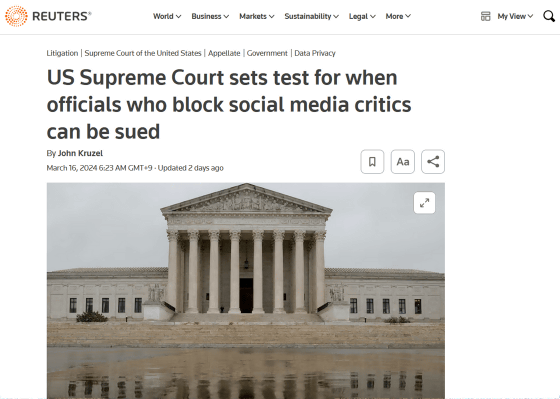``Politicians blocking ordinary people on social media may be unconstitutional,'' the U.S. Supreme Court agrees.

In recent years, there has been an increase in the number of cases in which politicians and government officials use their SNS accounts to make private or public communications, and as a result, voices have been raised that ``Isn't it a violation of the constitution for politicians to block ordinary people?'' I am.
US Supreme Court sets test for when officials who block social media critics can be sued | Reuters
https://www.reuters.com/legal/us-supreme-court-throws-out-rulings-public-officials-blocking-social-media-2024-03-15/

Public officials can block haters—but only sometimes, SCOTUS rules | Ars Technica
https://arstechnica.com/tech-policy/2024/03/public-officials-can-block-haters-but-only-sometimes-scotus-rules/
Supreme Court defines when it's illegal for public officials to block social media critics - The Verge
https://www.theverge.com/2024/3/15/24101983/supreme-court-public-officials-block-critics-social-media-lindke-v-freed
Most social networking sites have a feature that lets you 'block' users you don't want to interact with, allowing you to hide your account from those who are aggressive or persistent toward you. Sometimes the accounts of politicians and government officials block ordinary people, and in Japan, Taro Kono, Minister of Digital Administrative and Financial Reform, is known to block accounts including those of media personnel.
Meanwhile, there are voices saying, ``Isn't it a violation of the constitution for politicians and government officials' accounts to block ordinary people?'' This is based on the argument that being blocked from exchanging opinions with politicians and government officials online is a violation of the 'freedom of expression' guaranteed by the Constitution. Lawsuits have already been filed in the United States over the blocking of ordinary people by politicians and government officials, and in the past, a federal appeals court ruled against former President Donald Trump as ``unconstitutional.'' . The lawsuit against Mr. Trump was brought to the United States Supreme Court, but the trial was discontinued due to Mr. Trump's retirement in 2021.
In 2023, the U.S. Supreme Court will consider two cases brought in California and Michigan over whether the blocking of ordinary people by the accounts of politicians and government officials violates the First Amendment. I agreed to try the case.
The Supreme Court has begun examining whether it is legal to block others on SNS such as Twitter, with a particular focus on blocking by government officials - GIGAZINE

In a California lawsuit, two Poway Public School Board members were accused of blocking parents' X (formerly Twitter) and Facebook accounts. Board members claim they blocked the parents because they left dozens to hundreds of identical comments on the posts. The Ninth Circuit Court of Appeals in San Francisco ruled that the parents' First Amendment rights were violated.
In a Michigan lawsuit, Port Huron Mayor James Freed is accused of blocking Port Huron resident Kevin Lindke's Facebook account. Mr. Lindke said he was blocked when he sent a comment criticizing Mayor Freed regarding his response to COVID-19. The 6th Circuit Court of Appeals in Cincinnati rules in Mayor Freed's favor.

On March 15, 2024, the United States Supreme Court ruled that ``There are cases in which blocking of ordinary people by politicians and government officials is unconstitutional, and cases in which it is not,'' and the criteria for determining whether blocking is unconstitutional. I made it clear.
The United States Supreme Court pointed out that the First Amendment's protection of free speech restricts government officials, not ordinary people. Therefore, in determining whether blocking by politicians violates the constitution, it is important to determine whether ``the account's posts are made by a private person or whether they are made on behalf of the nation.'' .
The published criteria states that an account has 'actual authority to speak on behalf of the nation on a particular issue' and 'purports to exercise that authority when posting on social media.' It is said that blocking general users may be unconstitutional. Even if these powers and their exercise are not clearly stated, ``if a social media account is managed by a local government or a government office'' or ``if a government employee posts on a politician's personal account on behalf of the social media account''. It seems that if there is actual status as a representative of the country, such as ``if the account is handed over to another official when the term ends'', it may be recognized as a public account.
Because the U.S. Supreme Court has not set clear standards, blocking ordinary users with accounts that are both public and private in nature risks constitutional liability. However, if you completely separate your public and private accounts or include a disclaimer such as ``Posts express only personal views and do not speak on behalf of the nation.'' , it can reduce the risk of violating the Constitution.
Referring to the Michigan case, U.S. Supreme Court Justice Amy Coney Barrett said, ``Public figures seem to be constantly pressed for time, and it may be tempting to view every encounter as part of the job.'' 'But they are also private citizens with constitutional rights.' Politicians and government officials also have freedom of speech guaranteed by the First Amendment, so if Mayor Fried's block was done in a private capacity, it would be considered a violation of the First Amendment. I explained that it shouldn't happen.

With this ruling, the U.S. Supreme Court sent the California and Michigan cases back to lower courts. Lower courts will decide whether there was a violation of the First Amendment in each case.
Evelyn Danforth Scott of the American Civil Liberties Union , which is supporting the plaintiffs in the two lawsuits, said, ``This ruling means that the First Amendment still prohibits the government from shaping speech on social media. and how to pursue constitutional accountability for governments that censor social media content, restrict access, or unfairly privilege one viewpoint over another. 'It's for ordinary Americans,' he said, welcoming the ruling.
Related Posts:
in Note, Posted by log1h_ik







